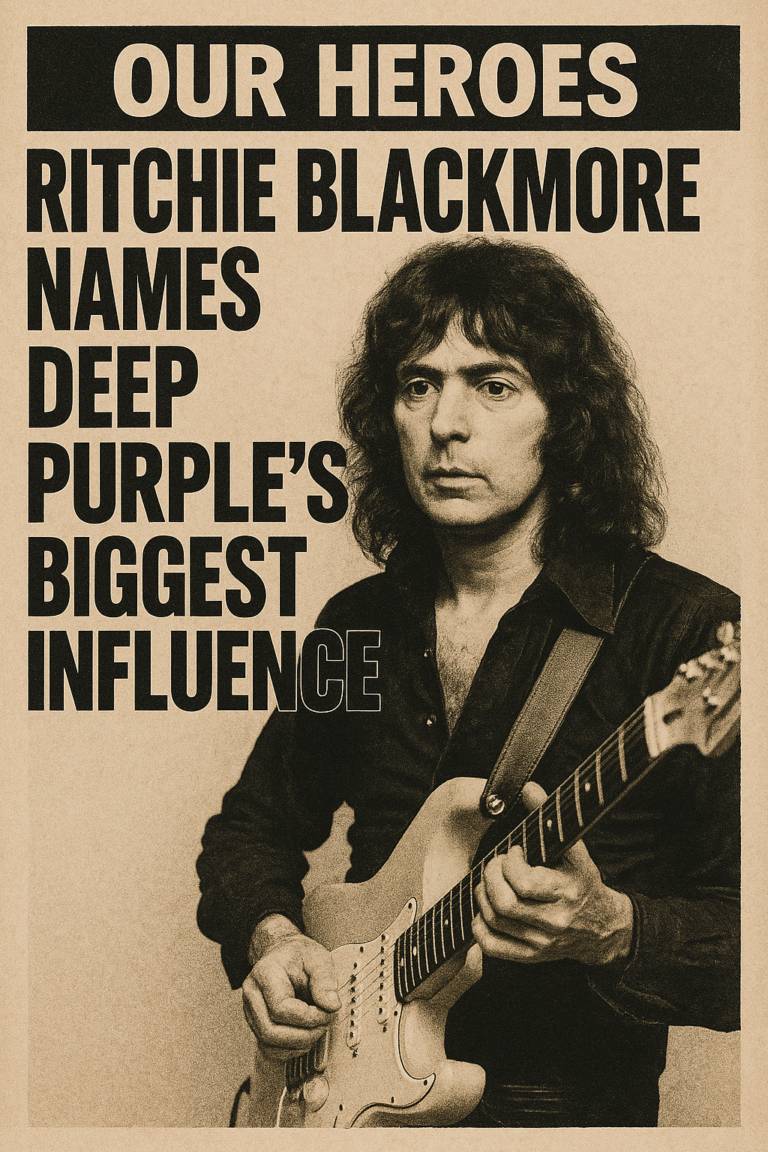“Our Heroes”: Ritchie Blackmore Names Deep Purple’s Biggest Influence
June 2025
In a candid and nostalgic reflection, legendary guitarist Ritchie Blackmore has revealed the band that served as the biggest influence on Deep Purple’s sound and philosophy. In a newly released interview with Classic Rock magazine, Blackmore pointed to none other than The Jimi Hendrix Experience as the group he and his Deep Purple bandmates revered during their formative years—referring to them as “our heroes.”
The revelation sheds fresh light on the roots of one of hard rock’s most influential bands, whose pioneering work in the late 1960s and early 1970s helped shape the foundations of heavy metal and progressive rock.
A Guitar Icon Pays Tribute
Ritchie Blackmore, often hailed as one of the greatest guitarists in rock history, is known for his innovative playing style, combining classical precision with blues aggression. While Deep Purple’s discography speaks to a wide range of influences—from classical music to jazz to British blues—Blackmore was unequivocal in naming Hendrix’s trio as the band’s primary north star in the early days.
“Hendrix changed everything,” Blackmore told Classic Rock. “When we first heard him, we were just blown away. He was doing things with the guitar that no one else had even imagined. He gave us a new language to work with.”
He continued:
“Jimi, Mitch [Mitchell], and Noel [Redding]—they were our heroes. We looked at The Experience not just for their sound, but for how they carried themselves, how they made every performance an event.”
The Hendrix Effect
The Jimi Hendrix Experience exploded onto the scene in the late 1960s with a bold, psychedelic sound that fused blues, rock, funk, and avant-garde experimentation. Hendrix’s debut album, Are You Experienced, released in 1967, sent shockwaves through the music world—including the then-burgeoning Deep Purple.
Though Deep Purple’s original lineup was still finding its voice with more pop-leaning covers like Hush, it was Hendrix’s fearless sonic approach that inspired Blackmore and keyboardist Jon Lord to push boundaries and intensify their own musical identity.
By the time Deep Purple Mark II was formed—with Ian Gillan and Roger Glover joining in 1969—the Hendrix influence had fully crystallized. Tracks like Speed King, Child in Time, and Smoke on the Water demonstrated an aggressive, high-voltage sound that bore the stamp of Hendrix’s legacy: expressive solos, experimental tones, and raw energy.
Shared Legacy in the Guitar World
Blackmore’s admiration for Hendrix has been well-documented over the years, though this latest interview marks one of his most open tributes. Despite having a distinct playing style—more structured and neoclassical compared to Hendrix’s wild improvisation—Blackmore has always acknowledged Hendrix’s impact on guitar playing as revolutionary.
“He didn’t just play the guitar—he lived through it,” Blackmore said. “Watching him perform was like watching a magician channel something from another world.”
Interestingly, while Hendrix influenced Blackmore, the admiration was mutual. Hendrix once commented in a 1969 interview that he appreciated Blackmore’s technique, calling him “a very intense player.”
The mutual respect, though unfulfilled by collaboration due to Hendrix’s untimely death in 1970, suggests that both artists saw in each other a kindred spirit—musicians determined to redefine the electric guitar.
Influence on Deep Purple’s Live Ethos
It wasn’t just Hendrix’s guitar work that inspired Deep Purple. The entire ethos of The Experience—improvisational flair, explosive performances, and studio experimentation—resonated deeply with the British band. This influence can be heard in Deep Purple’s famed live album Made in Japan, which, much like Hendrix’s legendary Monterey and Woodstock sets, showcased extended solos and spontaneous energy.
Drummer Ian Paice has also spoken in the past about Mitch Mitchell’s influence on his own playing. “Mitch was like a jazz drummer in a rock band,” Paice once said. “That opened my eyes. It wasn’t just about keeping time—it was about creating movement.”
More Than an Homage
Blackmore’s recent remarks underscore a deep sense of gratitude and humility. Despite being one of the architects of modern hard rock, he remains deferential to the artists who paved the way.
“We didn’t invent this stuff,” Blackmore said. “We absorbed it from those who came before us—Hendrix, Cream, Jeff Beck. But Hendrix… he was something else. Every note he played made us want to be better.”
A Timely Reflection
The timing of Blackmore’s tribute is especially poignant. As Deep Purple continues to tour in its latest lineup and Hendrix’s posthumous catalog continues to draw new fans, both artists’ legacies remain strong. The guitar, as a cultural symbol, has gone through cycles of popularity, but Blackmore’s comments serve as a reminder of its golden age—and the innovators who defined it.
For fans and historians alike, this moment of reflection adds another layer to the already rich story of Deep Purple and their place in the rock pantheon. It also reinforces the interconnectedness of the classic rock era, where even the biggest legends had idols of their own.
As Blackmore concluded:
“If there was no Hendrix, there might have been no Deep Purple as you know it. He made us believe we could do something special with sound. And for that, we’ll always owe him.”
From Hendrix’s wah-wah pedal to Blackmore’s scalloped fretboards, the ripples of innovation continue to shape music today. And as legends honor legends, rock history becomes a living conversation—loud, electric, and eternal.
